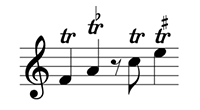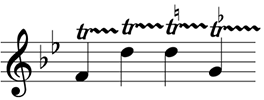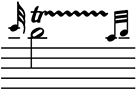The DU Lounge
Related: Culture Forums, Support ForumsAny classical musicians (esp. cellists) here today? I have a question for you...
When do you trill a note?
I ask because I notice that cellist Hauser trills a note from Handel's "Ombre mai fu" the second time he plays the passage, but not the first. It is very dramatic and quite tender and beautiful but I wonder if that is his choice. Is it optional?
watch him do this here:
Ocelot II
(115,732 posts)especially in Baroque music. If they aren't notated in a score the musician might add them but only in places where it wold be stylistically correct to do so.
The notation can look like this:

or this:

or this, with grace notes:

2naSalit
(86,646 posts)But with a much better response!
![]()
CTyankee
(63,912 posts)Ocelot II
(115,732 posts)or to indicate a cadence. Trills also set up a dissonance or suspension which makes the passage more interesting and leads to a conclusion (the cadence).
RainCaster
(10,883 posts)Thank you for showing that so clearly.
soldierant
(6,884 posts)in the Baroque period (when Handel lived) it was a convention on repeats for the player to add ornamentaion of (usually his then but occasionally her) own choosing. Many performers today (including singers) continue to honor that tradition. A trill is one possibility - there are others. It was sort of like how jazz musicians have been and are expected to be able to improvise. ....
Ocelot II
(115,732 posts)would ornament the repeated section elaborately. There were conventions for this that singers followed, but by Handel's time a lot of them weren't written down. It started in the early Baroque period, long before Handel, with the first operas, especially Monteverdi's. The aria Possente spirto from Orfeo is wildly ornamented (and many of those were written into the score by the composer, who wrote two versions - one simple, one ornamented).
CTyankee
(63,912 posts)blowing kisses your way Ocelot II!!!
Ocelot II
(115,732 posts)The whole aria is quite a bit longer, this is just a cut - but you get the idea. Another performance of the whole thing is here:
CTyankee
(63,912 posts)Ocelot II
(115,732 posts)A fascinating period in music history, quite experimental, a lot of my favorite music is from that time. Monteverdi was in most respects the inventor of modern opera - a great genius, very innovative.
soldierant
(6,884 posts)also picked it up and eventually it got - ironically - mnotonous, and also burdensome, The classical era represents the revolt.
Biophilic
(3,665 posts)CTyankee
(63,912 posts)CTyankee
(63,912 posts)and I swear he's got a hickey on his neck that you can see in the video...hmm....what was he up to before he gave this concert....
Biophilic
(3,665 posts)He’s never claimed to be anything except himself. He likes women, he likes sex and he’s a dyed in the wool romantic.
CTyankee
(63,912 posts)Blue Owl
(50,407 posts)It seems to be a common practice among "HIP" performers (historically informed performers) that when the score has a repeated section, the first time it is played relatively straight and the second time the performer(s) add trills and other ornaments, so it sounds a bit different the second time. I find that typically occurs on a lot of baroque period instrument recordings....
drthais
(870 posts)I am a pianist, not a cellist (but have a doctorate)
In a passage that has a repeat sign, and there is a trill marking over a note, the trill is played when the passage is repeated.
I do not remember where I read this, but it was understood that a repeated section not be a duplicate, but trills and/or other ornaments could be added, this making the repeat somewhat different.
CTyankee
(63,912 posts)He said he only played a trill if it was written in the music, as noted in this thread above.
Didyou notice in the video Hauser acknowledging the violinist several times? I wondered why and hubby said that in the absence of a conductor the First Chair violinist is in charge of the concert.
I loved Hauser's graceful finish with his bow...nice touch!
ProfessorGAC
(65,066 posts)Being trained in jazz piano, though, I can't opine on rules. There are no rules! ![]()
But, I use trills on piano, guitar, bass & the rare times I play violin.
I can play harp too, but I don't think there's a way to do a real trill as the sharping levers do not go discretely to the next semitone. More like bending a string on guitar.
My limited exposure to classical piano suggests, however, that players will embellish if they are the lead instrument. Embellishing during a repeated phrase makes perfect sense.